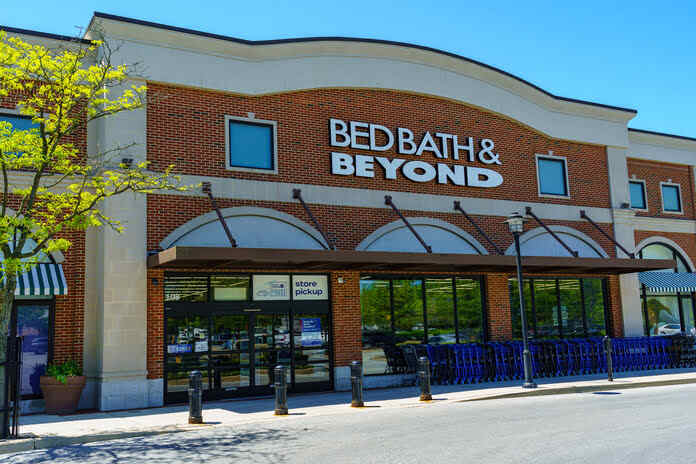BBBY Stock (NASDAQ:BBBY)
In recent years, the well-known retailer of household goods Bed Bath & Beyond (NASDAQ:BBBY) has had a tough time maintaining its financial footing. Because of the rise in popularity of online shopping, the corporation has had a hard time keeping up with the likes of Amazon and Walmart, two of its main competitors. To make matters even worse, the COVID-19 pandemic has had a significant impact on brick-and-mortar retailers, leading many of these establishments to permanently close their doors.
As a direct consequence of this, the share price of Bed Bath & Beyond has been moving in a downward trend for some time now. On the other hand, the shares of the company took a big knock on Thursday, plunging to new lows as the troubled retailer sought shareholder approval for a reverse stock split. In an ongoing effort to avoid going bankrupt, the corporation has taken a number of preventative measures, the most recent of which is this step.
The stock of troubled retailer Bed Bath & Beyond dropped to new lows on Thursday as the company sought approval from shareholders for a reverse stock split. This was the most recent move in a series of efforts to prevent the company from filing for bankruptcy. Let’s take a more in-depth look at the implications of this development for the company and the shareholders it serves.
The stock of troubled retailer Bed Bath & Beyond dropped to new lows on Thursday as the company sought approval from shareholders for a reverse stock split. This was the most recent move in a series of efforts to prevent the company from filing for bankruptcy.
According to the proxy filing that Bed Bath & Beyond (NASDAQ:BBBY) sent to the Securities and Exchange Commission late on Wednesday, the company is seeking shareholders to approve the reverse stock split at its special meeting on May 9 at a ratio that has not yet been set and could range anywhere from 1-for-10 to 1-for-20.
A reverse stock split involves converting each outstanding share of a company’s equity into a smaller number of total shares. Therefore, if it were to carry out a stock split of one for ten, each share of Bed Bath & Beyond would be equivalent to one-tenth of a new share.
What exactly is a “Reverse Stock Split,” though?
By reducing the number of shares that are currently in circulation, a corporation can boost the value of its stock through the use of a strategy known as a reverse stock split. When a corporation performs a reverse stock split, shareholders end up with a smaller number of shares in the business, but the value of each individual share goes up accordingly.
For instance, if a company has 1 million shares that are now existing and each share is worth $1, a reverse stock split might reduce the number of shares that are currently outstanding to 500,000 while simultaneously increasing the value of each share to $2. This results in the stock appearing to be more valuable and distinguished, which increases its appeal to potential investors.
This is not the first time that the corporation has presented the concept to its customers. Bed Bath cautioned that if the move wasn’t made, the company could eventually be forced into bankruptcy, an impending danger that has become more plausible in recent months.
The stock split is being done, as has been the case with practically all of Bed Bath & Beyond’s efforts in recent times, for the purpose of shoring up depleting cash reserves. This will allow the business to continue repaying debt and keeping stores stocked, despite growing concerns about its capacity to accomplish both of these things.
In order to improve its financial situation, the corporation had earlier declared its intention to raise $300 million by selling new shares. However, given that Bed Bath is now firmly established in the realm of penny stocks, the company is concerned that it will not draw sufficient investor interest, from both individual investors and larger institutions that may be prevented from purchasing stocks trading at such low prices. Bed Bath is concerned that it will not attract enough attention from investors.
Bed Bath noted in its filing that fixed-price brokerage commissions also have a negative impact on lower-priced stocks because they represent a greater percentage of the total transaction. “In particular, we believe that an increased share price would enable us to attract additional institutional investors and investment funds who may not consider purchasing our Common Stock due to our low trading price,” Bed Bath said.
Bed Bath, on the other hand, is optimistic that a reverse stock split will “ultimately improve the trading liquidity of our Common Stock, which we believe would benefit all stockholders” because “the combination of lower transaction costs and increased interest from institutional investors and investment funds could ultimately improve the trading liquidity of our Common Stock.”
It is possible that this is merely a stopgap measure; after all, $300 million worth of freshly issued stock would have to be dilutive to existing owners. As a result, the share price seems prepared to continue to be an issue unless there is a significant improvement in the company’s financial situation.
On Thursday, BBBY stock fell 8.3% to end the trading day at a little under 31 cents.
Featured Image: Megapixl















